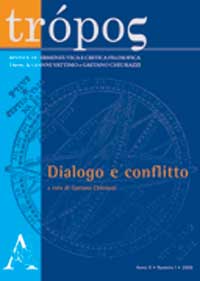
Abstract
This text shows how the tension between violence and brutality, on one side, and dialogue and persuasion, on the other, has always been the fundamental engine of Platonic thought. It will also show how this contrast intrinsically belongs to humankind, as it contains both animal and god. For Plato it is very problematic to find and follow a way in which the will to dialogue overcomes and unifies these opposite sides, all the most because dialogue itself and the will to persuasion can be infiltrated by exploitation and injustice. In conclusion, it is the strength of the myth of virtue and the will to elevate oneself towards the divine that allow the philosopher to find a way of defeating violence with the power of the law, thus indicating a path to humankind.
Keywords: violence, dialogue, Plato, relativism, truth
This text shows how the tension between violence and brutality, on one side, and dialogue and persuasion, on the other, has always been the fundamental engine of Platonic thought. It will also show how this contrast intrinsically belongs to humankind, as it contains both animal and god. For Plato it is very problematic to find and follow a way in which the will to dialogue overcomes and unifies these opposite sides, all the most because dialogue itself and the will to persuasion can be infiltrated by exploitation and injustice. In conclusion, it is the strength of the myth of virtue and the will to elevate oneself towards the divine that allow the philosopher to find a way of defeating violence with the power of the law, thus indicating a path to humankind.
Keywords: violence, dialogue, Plato, relativism, truth
| pagine: | 69-88 |
| DOI: | 10.4399/97888548284696 |
| data pubblicazione: | Novembre 2009 |
| editore: | Aracne |








